Evelyn:
"All this happened so long ago. And I never returned, never wrote,
never met anyone who might have given me news of Oxgodby. So, in
memory,
it stays as I left it, a sealed room furnished by the past, airless,
still,
ink long dry on a put-down pen.
But this was something I knew nothing of as I lifted the loop
and set
off across the meadow.
Stocken, Preseigne
September, 1978" (p.111)
This is the end of the book. But this locale doesn't sound
like England.
Does anyone know where it is?
Sofie:
(Evelyn) But this is something I knew nothing of as I lifted
the
loop and set off across the meadow.
Is he looking back with regret? or is he just remembering a notable
time in his life?
Evelyn:
(Book) But this is something I knew nothing of as I lifted the
loop
and set off across the meadow.
(Sofie) Is he looking back with regret? or is he just
remembering
a notable time in his life?
The latter. The whole book is a flashback. So he is remembering when
he left with all his various pieces of luggage and walked away.
I read the Cinematic Discourse on FOF on AMITC and it is v.
scholarly.
However, there seems to be a difference of opinion on whether Piers is
the mural's artist.
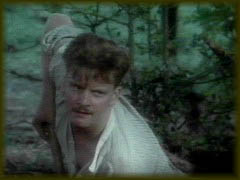 After
Tom and Moon dig in the pit, find the stone coffin and shroud, and peek
in, Moon says: "Then we'll put the chain back and leave him....But
first
we'll climb your ladder and have a look at his face before it fell
off."
(p.104) After
Tom and Moon dig in the pit, find the stone coffin and shroud, and peek
in, Moon says: "Then we'll put the chain back and leave him....But
first
we'll climb your ladder and have a look at his face before it fell
off."
(p.104)
Tom says: "Do you know, until that moment, it hadn't occurred
to me
that this bundle of bones was my falling man." (p.104)
Doesn't Tom say earlier that the artist had fallen and someone
else
had painted his face in?
This author is pretty tricky...makes you work for the
plot.
Laura:
Tom says most likely that the apprentice finished the mural.
Sofie:
I really enjoyed everyone's take on AMITC. Loved the scenes from the
book which helped me to understand the characters further.
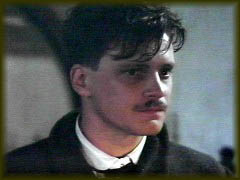 CF
does seem to give Tom this quality that makes you want to "make it all
better." When he enters the belfry for the first time I just want to
help
him take off those damp clothes make him a cup of hot tea and tuck him
in. Of course I'm speaking of my desire to nurture his poor wounded
soul.
I would go to any lengths to divert him from his painful memories of
the
war. CF
does seem to give Tom this quality that makes you want to "make it all
better." When he enters the belfry for the first time I just want to
help
him take off those damp clothes make him a cup of hot tea and tuck him
in. Of course I'm speaking of my desire to nurture his poor wounded
soul.
I would go to any lengths to divert him from his painful memories of
the
war.
Question to those who read the book. What was the purpose of
Moon being
a homosexual?
Cheryl:
(Nan) Dontcha just wanna kiss it and make it all better?
(Sofie)...you want to "make it all better."...help him take
off
those damp clothes...tuck him in...my desire......any lengths to...him
And the weird thing is, you think (I think) (one thinks) you really
can! With some screen stammerers (like Brad Dourif in "Cuckoo's Nest"),
you get the idea that it's hard wired, that it's been with them
forever,
it's a part of them. But with CF's you think you can soothe it, the
tension,
the conflict--right on the money. And like Heide, I didn't really get
the
first time through that it was from the war. Maybe the book made this
clearer.
Evelyn:
(Sofie) What was the purpose of Moon being a homosexual?
I didn't find anything explicit in the book. (But what is in this
book!)
Moon's psychological injuries, IMO are worse than Tom's. Also
he had
shrapnel in his leg which is why one saw him late at night trying to
straighten
it out.
Does anyone have an insight on Moon's homosexuality and its
place in
the story.
Tom's physical twitches and stammer subside. And while he
leaves sadly,
still one gets the feeling that he isn't the lonely pitiful person who
arrived in the beginning of the summer.
So, a question to ponder:
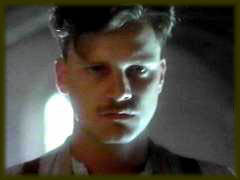 What
heals Tom? Restoring the mural? Alice? The children? The pastoral
countryside?
Friendship? Love? Art? Do you think that as he restored the mural it
became
a metaphor for his own healing or is the mural a venue through which he
healed? What
heals Tom? Restoring the mural? Alice? The children? The pastoral
countryside?
Friendship? Love? Art? Do you think that as he restored the mural it
became
a metaphor for his own healing or is the mural a venue through which he
healed?
Ann:
(Sofie) Moon's homosexuality?
Perhaps his name gives us a clue. Moon = crescent = Muslim. I think the
name is meant to draw a parallel between Moon and the Muslim Piers.
Where
Piers returned from the Crusades a converted Muslim and became an
outcast
in Oxgodby--and permanently remained one--Moon is also a permanent
outcast
in his society because of his homosexuality. Neither could convert to a
more socially acceptable way of life.
Perhaps this is also why Moon remains more damaged by the war
and doesn't
find the cure that Birkin does. Birkin could 'convert' himself back,
but
Moon, like Piers, must accept the way he is.
Evelyn:
Ann, I find your connection of Moon/Crescent/Muslim/Piers, both
outcasts
of society, very plausible. The puzzle coming together slowly.
I did some research over the weekend. At the end Old Mr.
Birkin (I figured
he must have been 85 years old when he returns in the film) signs off Stocken,
Prestigne September, 1978. The place didn't sound like England, but
I found it in E. Wales near the border, North of Hereford. Ripon (where
they went to purchase the organ, Alice apples, Sgt Milburn tells about
Moon) is in the middle of the moors NW of York.
Then I found on the map a town, at the tip of England almost
touching
N. Wales, called Birkenhead. Coincidental, I wonder?
Karen:
(Evelyn) However, there seems to be a difference of opinion on
whether
Piers is the mural's artist.
Finished the book and my take on it is that Piers and the muralist
are not one and the same. Tom is marveling throughout on the level of
detail
the muralist has used, especially on the falling man with the crescent
on his forehead. He considers this unknown artist to be decades ahead
of
Brueghel because of the detail used. Tom does believe that real people
were used to populate the mural. So it stands to reason that the artist
chose to use Piers, a Muslin convert, who had recently been discovered
and excommunicated as the model for that character.
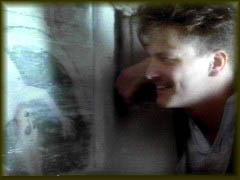 (Evelyn)
Doesn't Tom say earlier that the artist had fallen...and someone else
had
painted his face in? (Evelyn)
Doesn't Tom say earlier that the artist had fallen...and someone else
had
painted his face in?
Tom concludes that the artist fell from the scaffold but it was other
areas of the mural that were done by his apprentices_not the falling
man.
(Evelyn) What heals Tom?
Have concluded that it was Oxgodby because it brought together
everything
that he needed to return to the living. In Oxgodby, he finds what may
be
the greatest medieval mural of them all and he rediscovers Art and his
own abilities not as just someone who cleans up after artists. In
Oxgodby,
he meets Alice and he rediscovers Beauty and Love. In Oxgodby, he meets
Moon, with whom he can face the horrors of the war with someone with
shared
memories. In Oxgodby, he meets the Ellerbecks, primarily Kathy, who
befriend
him and show him the other side of religion, not the establishment
sort,
that didn't comfort him in the foxholes when he called out to that
God.
Kathy Ellerbeck is a little more. She's a little Tom. Perhaps,
that's
why he calls her his "kindred spirit." "We understood each other
perfectly
from the moment she flung open the door." (p.28)
(Ann) Moon is also a permanent outcast in his society
because of
his homosexuality. Neither could convert to a more socially acceptable
way of life.
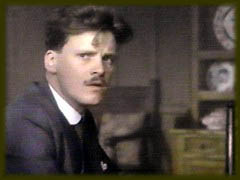 I
think the movie and the book deal with Moon's homosexuality
differently.
I need to go rewatch that part in the cafe in Ripon where Tom hears
about
Moon, but the impression I got was that Sergeant Milburn was totally
disgusted
with Moon. In the book, he is sympathetic to what happened to Moon. He
laughs and expresses thoughts that perhaps the powers that be made an
example
of Moon. I
think the movie and the book deal with Moon's homosexuality
differently.
I need to go rewatch that part in the cafe in Ripon where Tom hears
about
Moon, but the impression I got was that Sergeant Milburn was totally
disgusted
with Moon. In the book, he is sympathetic to what happened to Moon. He
laughs and expresses thoughts that perhaps the powers that be made an
example
of Moon.
"Crucified him. 'Corruption of young men'...Dishonour of the
king's
commission....' that sort of balls. His M.C. made it worse. Can't
understand
that." (p.91)
I think Moon's crime was that he was found out. Homosexuality
was always
around, but was not supposed to be in the open. Like AC or Wilde or a
zillion
other films.
Evelyn:
(Karen) Tom concludes that the artist fell from the scaffold
but
it was other areas of the mural that were done by his apprentices...not
the falling man.
Thanks Karen for clearing up the mystery. Your insight makes more
sense.
Surely, a Muslim would not have painted a religious mural.
And Oxgodby with all its "ingredients" is a logical healing
agent for
his condition.
Anybody else have any different takes on this?
Sofie:
I came to the conclusion that Oxgodby was more than just a nice place
to visit. It was as if the whole town was a metaphor for what people
need
in order to heal from the experience of war. He was not only restoring
himself with the mural, he was uncovering a mystery. The mystery itself
might be symbolic.
Karen:
(Sofie) It was as if the whole town was a metaphor for what
people
need in order to heal from the experience of war.
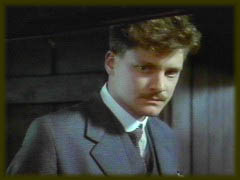 Very
nicely put. I'd forgotten to include the little girl who died. Birkin
came
face to face with a death more senseless than those resulting from war.
The death of an innocent child. I think this put his own experience
back
into perspective. Very
nicely put. I'd forgotten to include the little girl who died. Birkin
came
face to face with a death more senseless than those resulting from war.
The death of an innocent child. I think this put his own experience
back
into perspective.
(Sofie) He was not only restoring himself with the mural,
he was
uncovering a mystery. The mystery itself might be symbolic.
What do you mean by *mystery*? About the muralist? Would like to hear
how you see it as being symbolic.
Evelyn:
Sofie, by the "mystery" of the mural do you mean the fact that it had
laid uncovered for so many centuries?
Sofie:
(Karen) *mystery*
Tom arrives in Oxgodby a hurt and bitter man. It's dark and raining
and his reception by Keach is cold. When he watches Keach's sermon he
speaks
of Christ wanting some answers. I think he is speaking for himself. The
mural becomes symbolic of the answers he seeks. He turns and sees Alice
and in the next seen he is uncovering an angel. He has made assumptions
about the town's people as being a smug Yorkshire lot. His experience
has
made him view mankind as lacking in goodness and charity.
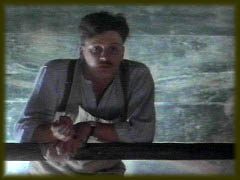 After
uncovering the angel, the children arrive bringing companionship and
music.
Their unjaded view of the world is expressed in genuine interest for
what
he is doing, which contrasts his view of simply being a laborer. After
uncovering the angel, the children arrive bringing companionship and
music.
Their unjaded view of the world is expressed in genuine interest for
what
he is doing, which contrasts his view of simply being a laborer.
When he first meets Alice he describes the mural as being a
puzzle.
It comes together slowly if it comes together at all. Alice describes
it
as being like opening a parcel at Christmas which is in direct
opposition
of his own pessimistic view. It is as if she seduces him back to life
as
he lies among the dead.
Keach is the antithesis of what Tom wants to be, yet it is as
if he
is holding a mirror up showing him what can happen if he shuts himself
off to life and love. It is also Keach who minimizes the importance of
restoring the mural as it will "distract." From his own self importance
maybe and the emptiness his life has become because of it.
Although Tom leaves the town without expressing his love and
desire
toward Alice, he is able to bite into the apple she has given him and
seems
to relish it without bitterness. He has solved the mystery as to who he
is. He can feel love and desire while remaining moral and
forgiving.
Karen:
Sofie, love your interpretation of the mystery of the mural, but I
think I prefer to look at Tom's experience in Oxgodby as the putting
together
of a broken jigsaw puzzle. He is more a broken man I think rather than
someone who doesn't know who he is.
(Sofie) Keach is the antithesis of what Tom wants to be,
yet it is
as if he is holding a mirror up showing him what can happen if he shuts
himself off to life and love.
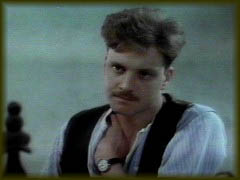 In
their final scene together, when he is paying Tom, Keach turns around
and
says (kind of): "I know what you think of me..." Keach is saying to Tom
that he is a *realist* He reminded me of the character played by Edward
Fox in The Choir. Someone has to attend to the business of the
Church. In
their final scene together, when he is paying Tom, Keach turns around
and
says (kind of): "I know what you think of me..." Keach is saying to Tom
that he is a *realist* He reminded me of the character played by Edward
Fox in The Choir. Someone has to attend to the business of the
Church.
I rewatched the movie last night and it was even *better*
after reading
the book. You can see and understand more of what people are saying and
little things that go on. For example, on the train at the very
beginning,
he bumps into someone in the aisle. You can make out an "excuse me"
said
very sarcastically. This goes so perfectly with the sarcasm and
cynicism
that fairly flies off the pages from paragraph one.
Oh, yes, the Sgt. Milburne meeting in Ripon is totally
different. In
the book, he is sympathetic to Moon's plight and that he got the shaft,
whereas in the movie he is bitter and the sentiment expressed is
resentful
that the other captains suffered while Moon got to sit out the
remainder
of the war in the glasshouse.
Evelyn:
(Karen) He is more a broken man I think rather than someone
who
doesn't know who he is.
Karen, do you think at the end Tom is still a broken, lonely man?
I tend to agree with whomever said that Oxgodby and the mural,
as a
conduit, helped to heal him.
Great insight into his persona, Sofie.
Karen:
(Evelyn) Karen, do you think at the end Tom is still a broken,
lonely
man?
Oh, no, he leaves Oxgodby sans stammer and twitches. He is on the mend.
When he returns, he is just looking back on the miraculous place and
time
he spent in the country. He is marveling at how such a place (the
church
and mural, the children, Alice via the book and rose) saved
him.
Bethan:
(Karen) When he returns
I don't think he's just looking back. I find almost unbearable pathos
in this scene. The old man's eyes are so sad. I always interpreted this
scene to mean that he never again found true love (what sort of future
would he have had with Vinny?) and that he carried the book and the
pressed
rose to remind him of the feelings he had for Mrs Keach and also the
times
when he came so close to declaring them. He briefly found happiness and
remembering the children only intensifies this feeling of loss.
Or am I being too fanciful? What sort of interpretation does
the book
give? Was this Tom's only experience of love?
Evelyn:
(Bethan) What sort of interpretation does the book give?
The book does not have Tom as an old man returning to Oxgodby. Or
biting
into the apple, for that matter. He says: "And I never returned, never
wrote, never met anyone who might have given me news of Oxgodby."
(p.111)
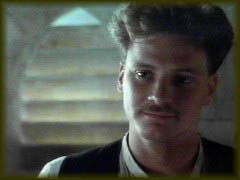 Before
that he says: "We can ask and ask but we can't have again what once
seemed
ours for ever - the way things looked, that church alone in the fields,
a
bed on a belfry floor, a remembered voice, a loved face. They've gone
and
you can only wait for the pain to pass." (p.111) Before
that he says: "We can ask and ask but we can't have again what once
seemed
ours for ever - the way things looked, that church alone in the fields,
a
bed on a belfry floor, a remembered voice, a loved face. They've gone
and
you can only wait for the pain to pass." (p.111)
Could also be recapturing youth. Have you ever done that?
Returned to
a place that has happy memories that can never be duplicated
again...that
could never go on forever.
This is one tricky author....lots of interpretations.
And Vinny, I hope that nymphomaniac wasn't around long!
Karen:
(Bethan) I don't think he's just looking back. I find almost
unbearable
pathos in this scene. The old man's eyes are so sad.
Oh dear, I thought I saw a little twinkle in his eyes. Was that a tear?
I must go back and check this out.
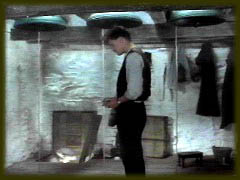 He
may not have worked things out with Vinny (the little tramp), but that
summer in Oxgodby gave him enough to make it through life and into old
manhood. ;-) He
may not have worked things out with Vinny (the little tramp), but that
summer in Oxgodby gave him enough to make it through life and into old
manhood. ;-)
|
 After
Tom and Moon dig in the pit, find the stone coffin and shroud, and peek
in, Moon says: "Then we'll put the chain back and leave him....But
first
we'll climb your ladder and have a look at his face before it fell
off."
(p.104)
After
Tom and Moon dig in the pit, find the stone coffin and shroud, and peek
in, Moon says: "Then we'll put the chain back and leave him....But
first
we'll climb your ladder and have a look at his face before it fell
off."
(p.104)  CF
does seem to give Tom this quality that makes you want to "make it all
better." When he enters the belfry for the first time I just want to
help
him take off those damp clothes make him a cup of hot tea and tuck him
in. Of course I'm speaking of my desire to nurture his poor wounded
soul.
I would go to any lengths to divert him from his painful memories of
the
war.
CF
does seem to give Tom this quality that makes you want to "make it all
better." When he enters the belfry for the first time I just want to
help
him take off those damp clothes make him a cup of hot tea and tuck him
in. Of course I'm speaking of my desire to nurture his poor wounded
soul.
I would go to any lengths to divert him from his painful memories of
the
war.  What
heals Tom? Restoring the mural? Alice? The children? The pastoral
countryside?
Friendship? Love? Art? Do you think that as he restored the mural it
became
a metaphor for his own healing or is the mural a venue through which he
healed?
What
heals Tom? Restoring the mural? Alice? The children? The pastoral
countryside?
Friendship? Love? Art? Do you think that as he restored the mural it
became
a metaphor for his own healing or is the mural a venue through which he
healed?  (Evelyn)
Doesn't Tom say earlier that the artist had fallen...and someone else
had
painted his face in?
(Evelyn)
Doesn't Tom say earlier that the artist had fallen...and someone else
had
painted his face in?  I
think the movie and the book deal with Moon's homosexuality
differently.
I need to go rewatch that part in the cafe in Ripon where Tom hears
about
Moon, but the impression I got was that Sergeant Milburn was totally
disgusted
with Moon. In the book, he is sympathetic to what happened to Moon. He
laughs and expresses thoughts that perhaps the powers that be made an
example
of Moon.
I
think the movie and the book deal with Moon's homosexuality
differently.
I need to go rewatch that part in the cafe in Ripon where Tom hears
about
Moon, but the impression I got was that Sergeant Milburn was totally
disgusted
with Moon. In the book, he is sympathetic to what happened to Moon. He
laughs and expresses thoughts that perhaps the powers that be made an
example
of Moon.  Very
nicely put. I'd forgotten to include the little girl who died. Birkin
came
face to face with a death more senseless than those resulting from war.
The death of an innocent child. I think this put his own experience
back
into perspective.
Very
nicely put. I'd forgotten to include the little girl who died. Birkin
came
face to face with a death more senseless than those resulting from war.
The death of an innocent child. I think this put his own experience
back
into perspective.  After
uncovering the angel, the children arrive bringing companionship and
music.
Their unjaded view of the world is expressed in genuine interest for
what
he is doing, which contrasts his view of simply being a laborer.
After
uncovering the angel, the children arrive bringing companionship and
music.
Their unjaded view of the world is expressed in genuine interest for
what
he is doing, which contrasts his view of simply being a laborer.  In
their final scene together, when he is paying Tom, Keach turns around
and
says (kind of): "I know what you think of me..." Keach is saying to Tom
that he is a *realist* He reminded me of the character played by Edward
Fox in The Choir. Someone has to attend to the business of the
Church.
In
their final scene together, when he is paying Tom, Keach turns around
and
says (kind of): "I know what you think of me..." Keach is saying to Tom
that he is a *realist* He reminded me of the character played by Edward
Fox in The Choir. Someone has to attend to the business of the
Church.  Before
that he says: "We can ask and ask but we can't have again what once
seemed
ours for ever - the way things looked, that church alone in the fields,
a
bed on a belfry floor, a remembered voice, a loved face. They've gone
and
you can only wait for the pain to pass." (p.111)
Before
that he says: "We can ask and ask but we can't have again what once
seemed
ours for ever - the way things looked, that church alone in the fields,
a
bed on a belfry floor, a remembered voice, a loved face. They've gone
and
you can only wait for the pain to pass." (p.111)  He
may not have worked things out with Vinny (the little tramp), but that
summer in Oxgodby gave him enough to make it through life and into old
manhood. ;-)
He
may not have worked things out with Vinny (the little tramp), but that
summer in Oxgodby gave him enough to make it through life and into old
manhood. ;-)